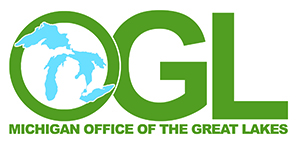
Mission and Program Areas
Michigan's Office of the Great Lakes leads policy development and implements programs to protect, restore, and sustain the world's premier freshwater lakes. It collaborates with partners to support sustainable use of coastal resources, coordinate restoration of severely degraded areas, manage water quality and quantity, prevent aquatic invasive species, and engage in emerging issues. The Office of the Great Lakes is committed to its Great Lakes mission to ensure a healthy environment, strong economy and high quality of life for the people of Michigan through its work.
Areas for Research Collaboration
Please contact the Office of the Great Lakes if you are interested in exploring partnerships on any of the following topics:
- Emerging contaminants affecting Great Lakes ecosystems and communities;
- Best practices for promoting water literacy and stewardship in Great Lakes communities;
- Linking monitoring and modeling of phosphorus-reduction effectiveness of agricultural conservation practices at multiple scales (e.g., edge-of-field, stream sub-basin, and watershed scales);
- Better understanding the biotic and abiotic influences on toxin production, concentration, distribution and fate of harmful algal blooms in the Western Lake Erie Basin;
- Data on coastal resiliency and the land/water interface on Michigan's Great Lakes shores:
- Need for systematic and comprehensive data on current rates or types of coastal wetlands loss in Michigan from ongoing shoreland development;
- Need for improved monitoring of the natural and social systems that comprise Michigan's Great Lakes shorelands using appropriate metrics, such as: ongoing patterns of shoreland development, coastal wetland habitats affected, Great Lakes beaches structured or otherwise impaired, local shoreland management activities engaged, local revenues generated from shoreline development, local costs incurred from shoreline development;
- Monitoring groundwater quantity and quality in Michigan:
- Re-establishing periodic or continuous measurement of water levels in key observation wells to identify changes or trends. No groundwater quality data have been collected in Michigan for establishing trends, except for a recent USGS study in glacial aquifers in southeast Michigan. Key data gaps include baseline and trends in anthropogenic chemicals and a baseline for stray gas in shallow aquifers in areas where hydrofracking is occurring or likely to occur.
Examples of Recent Research Partnerships
- Sustainable Small Harbors Project: Partnering with U-M Sea Grant and others to identify the barriers preventing small harbors from becoming economically, socially, and environmentally sustainable, and to equip coastal community leaders with the tools to assess and strengthen their own waterfront assets.
http://www.miseagrant.umich.edu/smallharborsustainability - Great Lakes Autonomous Vessel Technology: Partnering with Michigan Technological University to promote the development of autonomous vessel technology in the Great Lakes. Partners plan to develop the Smart Ships Coalition, presently focusing on small survey vessels, into a future research partnership.
- Watershed Assessment of Nutrient Loads to the Detroit River: Participating in a binational, three-year project through U-M to characterize nutrient loads to the Detroit River, compare the efficacy of different management options, and understanding the role that Lake St. Clair in nutrient retention. This collaborative research project will inform regional planning and the selection of nutrient reduction strategies to help achieve agreed upon water quality targets.
/project/assessing-detroit-river-nutrient-loads-lake-erie - St. Clair River AOC and Detroit River AOC Reef Restoration Projects: Partnering to restore historic fish spawning habitat in the Detroit and St. Clair Rivers by creating rocky spawning reefs on the river bottom. The team is using an adaptive management process to develop and study each restoration effort so that following projects incorporate lessons learned.
/project/restoring-fish-spawning-habitat-st-clair-and-detroit-rivers - River Raisin Cooling Hotspots Great Lakes Restoration Initiative (GLRI) Project: Leading a three-year project piloting a pay-for-performance program to reduce phosphorus loading in the River Raisin Watershed of southeastern Michigan that integrated a U-M-developed enhanced watershed SWAT model with Michigan State University's Great Lakes Watershed Management System (GLWMS).
https://www.stewardshipnetwork.org/sites/default/files/gilhouse_pay-for-performance.pdf - Coastal Communities Scenario-based Planning: Partnering with U-M to investigate what makes a Great Lakes Coastal Community resilient to the dynamic nature of living on the coast. This research is instrumental for transforming the planning methods and options forcommunities on the coast to become hazard-ready.
- Mapping and Evaluating Zones of Dynamic Coastal Influence of Coastal Wetlands in Michigan’s lower peninsula: Teaming with U-M faculty to advance knowledge of coastal wetland and surface water connectivity. The project provides advanced identification of locations of systems (e.g. zones) that are reasonably classified as Great Lakes coastal wetlands as well as coastal areas that could be inundated by storm surges during high water periods. The research will generate data layers for use in nature-based solutions for coastal community resiliency planning.
About the Office of the Great Lakes
The Michigan Office of the Great Lakes was created by the Michigan Legislature in 1985 under the Great Lakes Protection Act to lead policy development and implement programs to protect, restore, and sustain the Great Lakes ecosystem.
In addition to its core programs, the Office of the Great Lakes leads multi-level initiatives to address significant Great Lakes issues. It led the development of the state Water Strategy, a 30-year vision for Michigan's water resources.
Contact: Office of the Great Lakes, State of Michigan
Note: If you would like us to highlight your partnership efforts with U-M water researchers, please contact us.